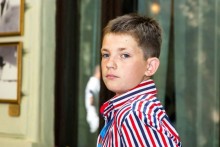“The project concept is classified so far,” Borys Chubin told us, “but I may say that it helps to determine the enemy’s position and direction of attack. My device will include universal data aggregator and platform for high-technology calculations. The project does not yet have a name, it is in the process of improvement, and will be put into production by the end of the year. This device will help to increase the success rate of our military operations manifold.”
The 14-year-old Chubin is an experienced inventor, working in design since age 2. His first projects were spaceships made from boxes. After these first baby steps, the boy started attending a robotics and computer programming school, where he moved on to more complex projects, so that he now has four completely original inventions to his credit. The boy developed his first device to help blind people. It is called iHelp. In order to replicate all the features required, Chubin not only consulted with blind people, but also conducted tests with himself as the subject.
“My witnessing a blind man being bullied by a few teens prompted me to work on this invention. He asked the boys what trolley had neared the stop, and they laughed at him and replied: ‘It is a green one!’ Soon afterwards, I participated in the National Social Project Competition and recalled that case. I decided that I could help these people. In general, everything can be improved by using new technologies. As part of e-government program, I came up with a project called ‘How to control out-of-control MPs.’ There is no time to develop it for now, especially as school is now six days a week,” Chubin told us.
Another of his projects, developed in cooperation with his friends Kostiantyn Kolianovsky and Elmira Eiubova and under Ihor Bohun’s direction, is a social network for the blind people: “It is a network with voice control and simultaneous translation into the language of the user. It offers segregator of hobby friends for people around the world, audio library, audio store, online choir, audio calling card and various clubs.”
It was the recent developments in Ukraine that prompted Chubin to develop a device for the army.
“I have developed this device for the Ukrainian military, because I know how hard they are having it now. I saw a short film about the Azov battalion and was present at a farewell ceremony for the fallen soldiers which took place at the Odesa Opera House. I realized that to help our boys was my duty. Although I cannot go to war, I can still be useful. I think I will develop other devices in this field,” the boy said.
Chubin believes that the use of new technologies could give the Ukrainian army a decisive advantage. According to him, every company has to contribute to the victory. Regarding the financing of the project, it will come from Ukrainian sponsors, and developers will invest their own money in the project as well.
“We have not yet identified the amount required,” Chubin said. “Overall, we develop this project as volunteers. This is not a commercial development. We are ready to give it for free for the needs of the country, it will be a great contribution. In my opinion, profiting from the war is unacceptable. He who tries to put a price on this project is in fact putting a price on the independence and sovereignty of our country. We cannot let this happen. If we release this device, it will not be used outside Ukraine.”
Chubin describes technology behind their inventions very carefully, so that no one could steal the idea. It is justified by the fact that a Russian company has already stolen the boy’s idea and begun producing devices for the blind. Chubin has become more vigilant and protective on his development, especially as it is war-related. “The story goes thus: I have created a complete concept of my device for the blind people. It was assembly-ready, twice won Ukrainian social innovation competitions, and had become a hot topic in the media. My invention was even covered in a Russian popular science newspaper, whose editors asked me to send them all the blueprints of the device, down to exterior drawings. Fortunately, we sent only part of the materials. Recently, a Kyiv company volunteered to produce devices for my development. We were about to start production, but active phase of the Euromaidan crisis intervened, and we had to postpone work. I learned a few days ago that the Russian company that has been producing radio-electronic products for military and civilian uses announced the release of a similar device. Functionally, they overlap by 75 percent. I know the theory of ‘wandering ideas.’ In general, such coincidences are theoretically possible, but after this incident I do not want to discuss inventions that have not yet been into production,” the inventor said.
People call Chubin a young genius and future millionaire, but the boy does not like it. “I am tired of being ‘a young genius,’” he said. “I believe that all children are talented, we just need to give them a chance. My friends and I held the First Municipal Forum of Schoolchildren’s Social Projects among school children of Odesa, aimed at helping people with disabilities. On a voluntary basis, we cooperate with the best coaches, project managers, social activists, financial analysts, and programmers. We teach active teens correct ways to create and develop their own projects.”
Chubin got invited to study in Germany recently, but the boy refused. “One can learn everywhere. While Ukraine is at war, I may not go anywhere, but will try to do everything in my power to ensure that our guys live. Frankly, the Ukrainian army’s fighting techniques are totally outdated. The military technology has gone so far ahead that we should seriously reconsider the whole concept of the nation’s armaments and defense capabilities.”







